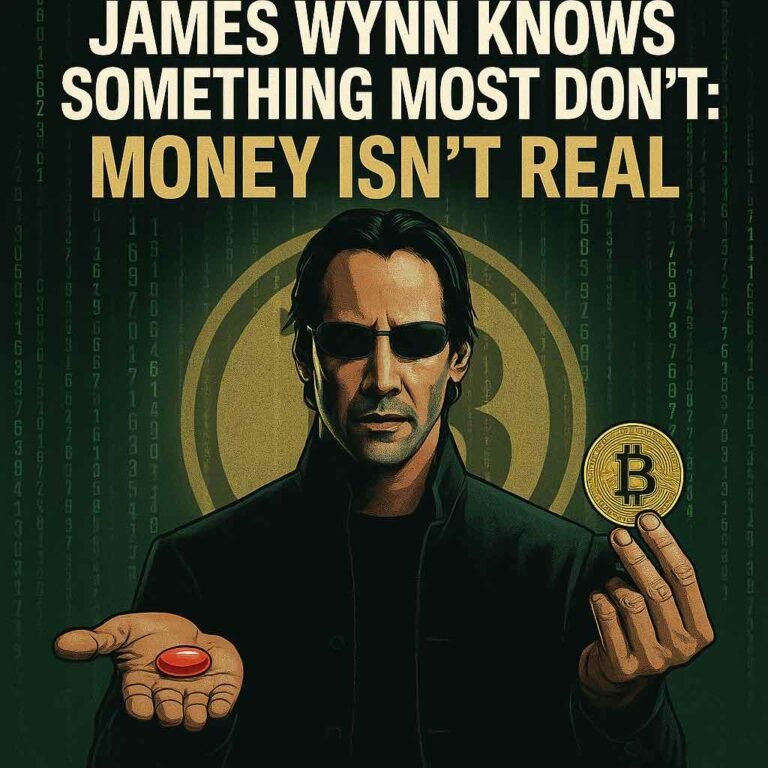
June 2, 2025
Coach G
No Comments
James Wynn’s reported loss of $100M, as highlighted in an X post, didn’t lead to despair but to a reaffirmation of a core belief: money is a tool, not the goal. This echoes sentiments attributed to Andrew Tate, who often frames money as a byproduct of discipline, action, and mindset rather than an end in itself. Both figures, in their own ways, challenge the conventional obsession with wealth as a marker of worth. Their philosophy aligns with ancient teachings, stoicism, Taoism, and even alchemical traditions, that emphasize inner transformation over external accumulation.
The story begins with a rejection of the “Matrix,” a term Tate uses to describe societal conditioning that traps people in fear, scarcity, and compliance. Wynn’s calm response to losing $100M suggests he’s internalized this, viewing money as a transient score in a larger game. This mindset isn’t about dismissing money’s utility but recognizing it as a bridge, a means to achieve freedom, influence, or impact, not the destination.
What It Truly Means
At its core, this philosophy is about redefining value. Money, as Wynn and Tate suggest, is a human construct, a ledger of perceived value that society agrees upon. It’s not “real” in the sense of being an intrinsic, eternal truth. Instead, it’s a tool for navigating the material world. What matters is the inner game, your mindset, resilience, and ability to create value through action and intention.
This aligns with quantum psychology, which views reality as shaped by perception and belief. In quantum terms, your mental state collapses possibilities into outcomes. If you believe money is scarce, you’ll act from fear, hoarding or chasing it desperately. If you see it as abundant, as Tate advocates, you’ll take risks, innovate, and attract opportunities. Wynn’s lack of panic suggests he operates from this abundance mindset, trusting his ability to “make it back” because he understands the game is ongoing and his inner resources, knowledge, discipline, networks, ARE the true wealth.
The alchemical truth here is the metaphor of turning lead into gold, not literally but within the self. The “gold within” is your potential—creativity, resilience, wisdom—that, when refined through discipline and self-awareness, produces external results (like money). Ancient alchemical texts, like those explored in James Hillman’s work, describe this as a process of transformation through stages like Nigredo (facing darkness) and Albedo (purification) to reach Rubedo (enlightenment). Wynn’s equanimity in the face of loss reflects this: he’s navigated the Nigredo of financial setback, trusting the process to lead to renewal.
What Actually Matters
What matters is mastery of self. Money, status, or external validation are fleeting; they’re tools to amplify your impact, not your identity. Ancient teachings, from Stoic philosophers like Marcus Aurelius to Taoist sages like Lao Tzu, emphasize cultivating inner virtues (courage, wisdom, detachment) over clinging to material outcomes. Tate’s teachings, while controversial, echo this by stressing discipline, mental toughness, and rejecting societal narratives that equate wealth with worth.
In practical terms, this means:
- Prioritizing action over emotion: Wynn’s lack of “rage or panic” shows he’s playing to win, not to feel validated by temporary outcomes.
- Building resilience: Tate’s emphasis on seeing failure as a lesson aligns with stoic principles of embracing setbacks as growth opportunities.
- Focusing on the inner gold: Your skills, mindset, and relationships are your true capital. Money is a bridge to leverage these, not the end goal.
Applying Quantum Psychology and Alchemical Truths
Quantum psychology suggests that your beliefs shape your reality. To apply this:
- Shift your money blueprint: As T. Harv Eker notes in Secrets of the Millionaire Mind, your financial outcomes stem from subconscious beliefs. Audit your beliefs, do you see money as scarce or abundant? Reframe it as a tool, not a master.
- Visualize and act: Tate advocates affirmations and visualization to overcome limiting beliefs. Picture your goals vividly, then take relentless action to collapse possibilities into reality.
- Embrace the Nigredo: Alchemical transformation requires facing discomfort. Losses, like Wynn’s, are opportunities to shed outdated fears and refine your approach.
Critical Perspective
While this mindset is empowering, it’s not without flaws. Tate’s rhetoric, for instance, often veers into toxicity, promoting misogyny or materialism that contradicts the deeper wisdom of self-mastery. Wynn’s claim that “money isn’t real” risks oversimplifying systemic economic realities, money may be a construct, but its absence can have real consequences for those without his resources. Ancient teachings, while profound, can feel abstract when applied to modern financial pressures. The challenge is balancing this mindset with practical responsibility.
Making the Most of It
To live this philosophy:
- Treat money as a bridge: Use it to build skills, networks, or freedom, not to define your worth.
- Cultivate the gold within: Invest in learning, health, and relationships. As Tate suggests, surround yourself with high-value people to amplify opportunities.
- Play the long game: Like Wynn, focus on the process, not the score. Losses are temporary if your mindset is resilient.
- Integrate ancient wisdom: Practice detachment (Stoicism), flow with challenges (Taoism), and transform setbacks into growth (alchemy).
In essence, the story from Wynn to Tate to ancient teachings is about transcending society’s obsession with money as the ultimate prize. It’s a call to master your mind, harness your potential, and use money as a tool to manifest your inner gold. By applying quantum psychology’s focus on belief-shaping reality and alchemy’s transformative journey, you can play the game to win, on your terms.
Let’s Keep the Growth Going
You’ve come this far for a reason. Stay connected and receive insights that meet you where you are—right in your inbox.
- Join our Newsletter -
Share:
Categories
Popular Posts
Don’t Fall in Love. Rise in Love.
January 22, 2026
Tags
Book Summary
Coach G
Coaching
consciousness
ego
Emotional Healing
Emotional Intelligence
Emotional Resilience
empowerment
faith
forgiveness
Growth Mindset
healing
Inner Peace
law of attraction
letting go
life coach
life coach Dubai
Life Coaching
Life Coaching Dubai
Manifestation
marriage
Mental Health
Mindfulness
Mindset Shift
oneness
Personal Development
personal growth
Personal Transformation
Positive Mindset
productivity
quantum psychology
relationships
Resilience
Self-Awareness
Self-Discovery
Self-Improvement
Spiritual Awakening
spiritual coach
spiritual growth
spirituality
Success Mindset
Time Management
Transformation
Universal Laws
Useful Links
Quick Menu
Contact Us
- +971585541780
- info@coach-g.com
- Al Murjan tower, Al Marsa Street Dubai Marina
© 2025 Coach G Dubai. All rights reserved.




